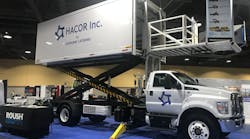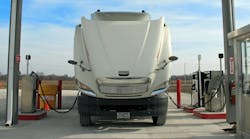Propane autogas has been used worldwide for more than 100 years and is the third leading transportation fuel in the world, behind gasoline and diesel. Over the years, the alternative fuel has been gaining more interest, especially in heavy duty vehicles.
“The benefits are cost reduction and emissions reduction," says Todd Mouw, president, ROUSH CleanTech. "Ultimately, it’s sustainability in two ways: economics and environmental. That’s why you are seeing more fleets across the country including almost 1,000 school districts in 49 states and Canada are making the change.”
Currently, ROUSH CleanTech focuses on commercial and government fleets including Class 4-7 vehicles and school buses. The engineering company believes in all propulsion technologies and have invested in others in addition to propane, such as electric vehicle and compressed natural gas.
“We really think that because propane has a great profile from a standpoint of both technical, as well as from the fleet perspective, we can integrate our technology into a truck without compromising how that asset needs to do its job and give it sufficient range, power, torque, and performance while reducing emissions and cost,” Mouw states.
Even with the latest push in electric vehicles, there are still many reasons propane autogas and other propulsion technologies make sense, one being the expense.
Mouw notes that he believes the future is very bright and that he understands the drive that everyone wants to make every vehicle electric. However, it’s going to take the country to meet all the requirements and until then, he says fleets should “use propane where it makes sense, use electric vehicles where it makes sense, use hydrogen where it makes sense, and use natural gas where it makes sense.”
“The batteries for electric vehicles are really expensive," Mouw adds. "For us, to put that technology into a heavy duty truck and make it economic sense is tough. Plus, to give it enough range to do its job we would have to pack enough batteries on board, which may impact the payload of that truck. So, maybe that truck as it fits today couldn’t do the job that it needs to do and another truck is needed. There are a lot of things we need to get sorted out with electric vehicles; it’s not quite ready for commercial viability yet with a ton of subsidy. For example, a propane school bus costs about $100,000. An electric school bus costs $400,000.”
When it comes to maintenance, propane autogas vehicles have fewer parts to maintain, service, and support compared to diesel. “You don’t have regeneration like you do with diesel," Mouw notes. "It should be getting easier for fleets to make that transition away from diesel to propane.”
Recently, ROUSH CleanTech attended the Advanced Clean Transportation (ACT) Expo in Long Beach, California, and displayed one of their trucks fueled by propane autogas in partnership with Hacor Inc.
Hacor Inc., an airline catering services provider, purchased seven Ford F-750 trucks for use at Los Angeles International Airport (LAX). Los Angeles World Airports (LAWA) are requiring their operators at places like LAX to move to a near zero type of engine technology. “Because we’re certified at .02 grams of NOx, the lowest standard possible in carb size, our technology qualified for Hacor Inc. to make that shift away from diesel,” says Mouw.
With California moving to low or no emissions technology, many operators will begin the transition from diesel to propane. “We’re excited about the growth of propane and that there’s a technology that helps fleets do their job and can save them money along the way; everybody wins,” Mouw concludes.



